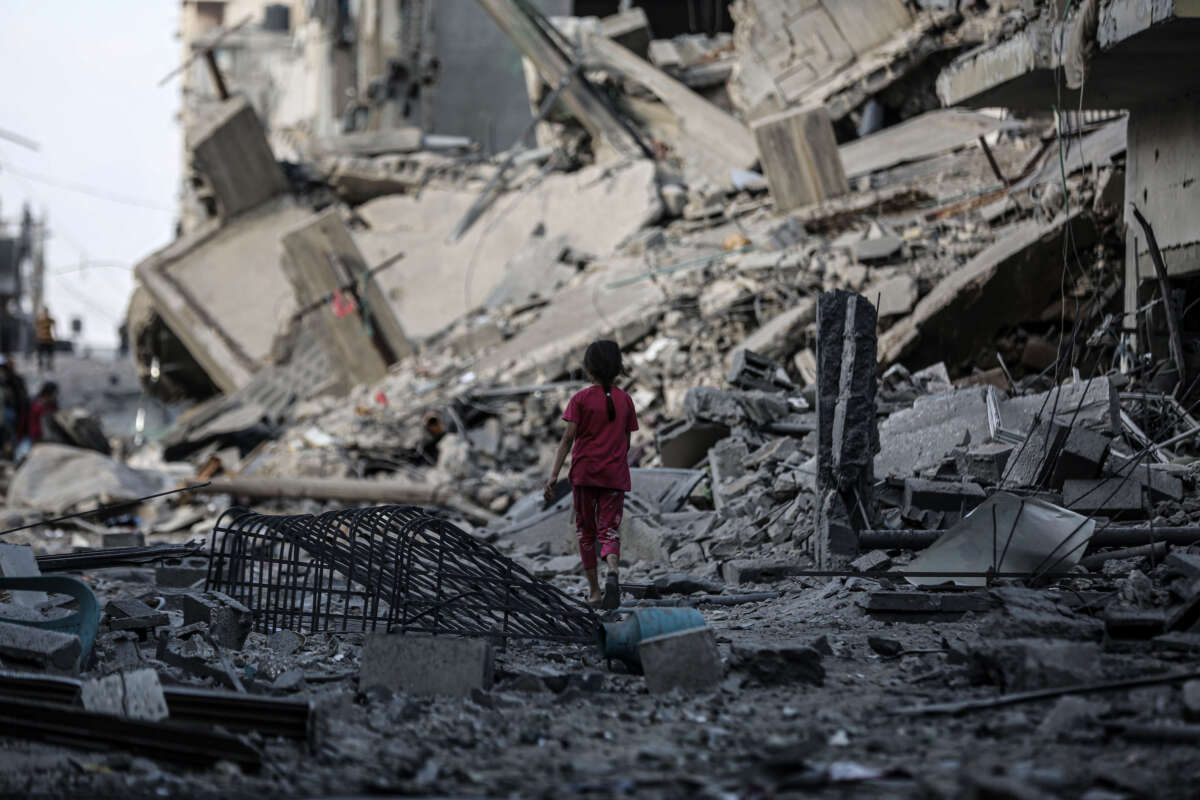
By Sharon Zhang , TRUTHOUT
The UN’s children’s agency has reported that Israel’s genocidal siege of Gaza has orphaned 19,000 Palestinian children so far— one of the many horrific effects of the four-month assault that cannot be captured by sheer data on the 27,000-person death toll.
Per BBC, UNICEF reports that aid groups are attempting to help these children locate family members who can take care of them, but it is difficult to do so with the children either in a deeply traumatized state or too young to communicate much of anything.
“Many of these children have been found under the rubble or have lost their parents in the bombing of their home,” said Jonathan Crickx, UNICEF Palestine communications chief, to the BBC, with other children having been found lost on the streets, in hospitals or at Israeli checkpoints. “The youngest ones very often cannot say their name and even the older ones are usually in shock so it can be extremely difficult to identify them and potentially regroup them with their extended family.”
All 1.1 million of the children in Gaza are currently in need of mental health assistance, according to UNICEF — but, with Israel having destroyed nearly the entire health care system in the region, there are little to no resources to be found. The vast majority of children have been displaced from their homes, and Euro-Med Human Rights Monitor estimates that over 24,000 children have lost at least one parent.
This is on top of the unending violence that Palestinian children are facing themselves. Just two months into Israel’s assault, UNICEF estimated that at least 1,000 children had had one or both legs amputated. Further, Israeli forces have killed over 10,000 children in roughly 100 days of their assault, as Save the Children reported earlier this month, or a rate of about 100 children per day. Experts have said that Israel’s siege is the deadliest assault on children in any modern combat zone.
The statistics on their own suggest unfathomable horrors. Stories from Palestinians and aid workers on the ground are even more outright appalling.
BBC, for instance, describes how health care workers were forced to deliver a baby via c-section after her mother was killed by an Israeli airstrike — the mother, Hanna Abu Amsha, didn’t live long enough to name her daughter. One child, Abed Hussein, and his cousins have each lost one or both parents, and he described how he can no longer sleep at night with Israeli bombs constantly going off in the background.
“The missile fell on my mum’s lap and her body was torn into pieces. For days we were taking her body parts from the rubble of the house,” Hussein told BBC. “When they said that my brother, my uncle and my whole family were killed I felt like my heart was bleeding with fire…. When my mum and dad were alive, I used to sleep but after they were killed, I can’t sleep any more. I used to sleep next to my dad.”
A recent New Yorker interview with Seema Jilani, a doctor with the International Rescue Committee who went to assist with medical aid at Al-Aqsa Hospital in central Gaza, revealed other horrors. Jilani described how Israel has torn away the layers of basic human society in Gaza — the main struggle each day for most Palestinians, she said, is to avoid death by bomb, starvation, dehydration, infection, and more, making it nearly impossible for children to cope.
“[A] seven-year-old had deep lacerations to his leg and needed some suturing. It wasn’t a life or death case — it was very simple — but the only pain relief we had was Motrin, which was frankly cruel, and a cruel undertaking. There was no ketamine,” Jilani said.
“So I tried to distract him from the pain. Usually what I would do is ask questions like, ‘So who’s your best friend?’ I can’t ask that because what if his best friend’s dead? ‘What’s your favorite subject at school?’ He hasn’t been to school in three months. ‘What’s your favorite food?’ I don’t know when the last time he ate would be,” she continued. “Every single facet of their society has been ripped apart.”
